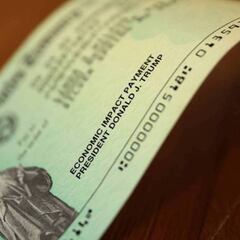Will there be another stimulus check in June?
The first round of stimulus check payments were distributed by the IRS in April and there has been talk since of a second stimulus package. But will it happen?

The US House of Representives passed a fourth stimulus relief package last week by 208 votes to 199. The $3 trillion Heroes Act includes a second round of $1,200 stimulus checks, another $200 billion in hazard pay for essential workers, and six further months of COVID-19 unemployment along with other help for state and local assistance.
The HEROES (Health and Economic Recovery Omnibus Emergency Solutions) Act will still face significant opposition from the Republican-controlled Senate and the White House but if the bill fails to pass into law after debate on the floor of the upper house, a consensus compromise is still expected to be reached between Democrats and Republicans to provide hard-hit Americans with a second round of financial support sometime during May or possibly June at this rate.
Indeed, the proposed legislation has been described by the White House and Republican senators as "dead on arrival", while the Senate majority leader, Mitch McConnell, has dismissed the package as a “partisan wish list with no chance of becoming law”. Pelosi, however, says the Democrats have shown their hand and are now willing to negotiate.
- What's in the HEROES Act, the proposed $3tn relief package? - read
- When is the HEROES Act being voted on? - read
- House of Representatives passes HEROES Act - read
- How would the HEROES Act affect immigrants? - read
- How would the HEROES Act affect student loans? - read
- Trump keen on second stimulus check - read
Debate over second round of stimulus checks
“Let me state the obvious,” said John Barrasso, a senator from Wyoming, meanwhile. “What [House Speaker] Nancy Pelosi is proposing will never pass the Senate."
The big debate over recent weeks and the one that will have the most direct impact on struggling families is whether or not there will be a second round of stimulus checks in the month of June, with many arguing that $1,200 is unlikely to cover the expenses for people who have lost their jobs or have faced additional financial obstacles in the past weeks.
“We could very well do a second round of direct payments,” President Donald Trump said while answering press questions earlier this month. “It is absolutely under serious consideration.” Recently however, Trump appears to have cooled on direct support for hard-working Americans, preferring to back other measures, such as payroll tax cuts. And the White House was said to be analysing a new $5,000 payment proposal with a difference.
- Where to claim unemployment benefits in the US: phone, online - read
- Will the IRS contact me about my stimulus check? - read
- Who needs to use the non-filer application? - read
- How to track status with the Get My Payment IRS portal - read
- Who receives IRS debit cards and how many are being sent? - read
Hassett says second stimulus check will be considered
Donald Trump's senior economioc advisor, Kevin Hassett says they are most certainly willing to consider it though even if he doesn't sound overly enthusiastic. “Depending on the state of the economy, it’s something that I guess we would consider,” Hassett said Sunday on CNN’s “State of the Union.”
“Right now, it looks like the economy’s picking up at a very rapid rate, in which case we could potentially move on to other things that the president has mentioned, like the payroll tax cut and potentially even a capital gains holiday,” Hassett added.
“I don’t think those are things you can do quickly,” said Republican Whip John Thune of South Dakota.
The following is an overview timeline of the actions taken in response to the coronavirus pandemic in the US:
March 3 and March 15 - The Fed cuts interest rates in two emergency meetings on March 3 and March 15 (50 and 100 basis points respectively), taking the federal funds rate to 0-0.25%. It also cut the discount window rate by 150 basis points.
March 18 - The Fed rolls out its third emergency credit program in two days.
March 23 - The Fed promises unlimited, spending response to the crisis open-ended QE, including purchases of to near $3 trillion. corporate and municipal bonds.
March 27 - CARES Act signed into law
March 31 - The Fed broadens access to dollars with repo agreements for foreign central banks.
April 9 - The Fed rolls out $2.3 trillion to backstop 'Main Street' local governments and small and mid-sized businesses.
Related stories
April 27 - The Fed broadens its help for local governments, offering to buy bonds of up to three years' duration from counties with as few as 500,000 residents and cities with as few as 250,000 residents.
May 15 - US House of Representatives passes HEROES Act.

